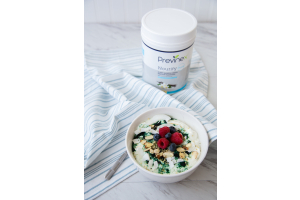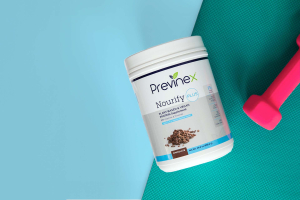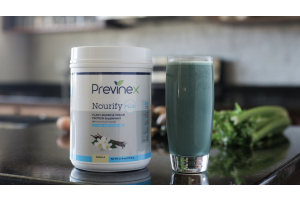
Did you know almost one pound of your body weight is made up of bacteria cells? In fact, your gut is filled with over one trillion of these microscopic bugs right now. Some are friendly, “good” bacteria, while others are harmful and disease-causing. For most people, the balance of good versus bad bacteria is way off, where high levels of bad bacteria outnumber the good, which can potentially wreak havoc on your health.
There is a constant battle between good and bad bacteria that is taking place in your gut every day! To help you take better care of your digestive health here are 7 Things To Know About Gut Health & Probiotics…
1) Gut Health Is Critical To Overall Health
Did you know that 70% of the bacteria and 80% of the immune cells in your body reside in your gut? With that in mind, gut health is a critical component and key driver of overall health.
2) Probiotics Help Regulate Digestion
Probiotics are live friendly/good bacteria that live in our gut and help regulate and promote digestive health. They promote all aspects of digestion, including the breakdown of food, absorption of nutrients, and the removal of waste.
3) A Healthy Balance of “Good” vs. “Bad” Bacteria Is Critical
Gut bacteria is not created equal; ‘good’ and ‘bad’ bacteria are produced every day. ‘Good’ bacteria is critical for healthy digestion, strengthening your immune system, and keeping your body’s vitamins in balance. In contrast, ‘bad’ bacteria can cause a wide array of issues ranging from digestive issues, to weakened immune system, to mental issues, skin conditions, and more. It’s important to manage your gut bacteria to ensure that you have enough ‘good’ bacteria as it can lead to a host of health improvements.
4) What Are Prebiotics & Why Do I Need Them?
The Mayo Clinic defines prebiotics as “non-digestible carbohydrates that act as food for probiotics.” Unlike probiotics, prebiotics are not alive and are able to enter the gut and be the food source for the probiotics. Prebiotics significantly enhance the effectiveness of the strains of healthy bacteria (probiotics) and accelerate the growth and colonization the healthy bacteria in the intestinal tract.
5) What Does CFU Mean?
CFU is an acronym that refers to “colony forming unit”. CFU is used to measure how many bacteria in your probiotics are capable of dividing and forming good bacteria colonies. Most probiotic foods and supplements don’t contain nearly enough CFUs at levels where studies show clinical benefits (25-30 billion), so be on the lookout.
6) What Does “Strains Of Bacteria/Probiotics” Mean?
Different strains of bacteria provide different benefits to your gut, so it’s critical to ensure you’re getting a wide variety of these strains in your diet or through supplementation.
For example, the strain Lactobaccilus acidophilus helps maintain balance of ‘good’ and ‘bad’ bacteria. It also may help maintain cholesterol levels. The Bifidobacterium lactis strain has been shown to boost immunity and prevent digestive ills. The key here is diversity. You want at least 5-6 different strains of bacteria in a probiotic, as different strains address different areas of digestive health. And more strains doesn’t necessarily mean “better,” so be careful here.
7) What’s The Best Way To Improve My Gut Health?
A healthy diet is a good start, and eating fermented vegetables and cultured dairy products can assist in aiding gut health. Also, regular exercise, good sleeping habits, and managing stress can help as well. In addition, adding a pharmaceutical grade, clinically tested probiotic that contains 25-30 billion CFU with approximately 4-6 different strains and a prebiotic can do wonders for your gut health!





